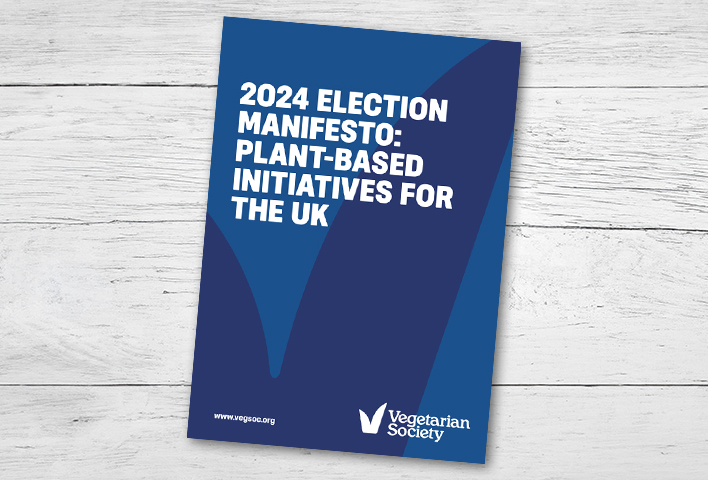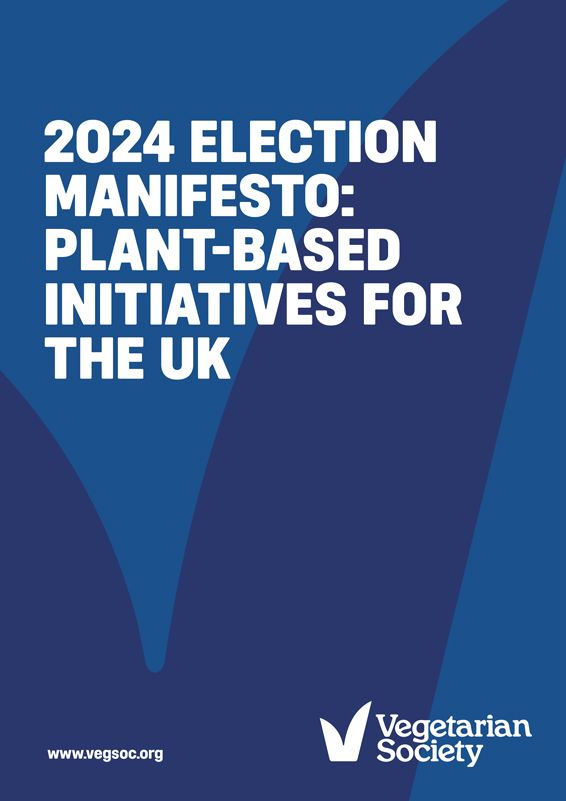Manifesto 2024: The Vegetarian Society launches a positive plant-based vision for the next parliament

With the election just around the corner and debates sparking across the media, it’s clear that as a nation we face all manner of significant challenges. From the Vegetarian Society’s point of view, one of the key electoral issues relates to our food system, which is driving climate change, food insecurity, animal welfare issues and poor health outcomes across society.
This is why we are today launching our own manifesto for change – targeted at the incoming government and which over the next five years seeks to address the problems with our current food system, putting climate, biodiversity, animal welfare and public health at the heart of our future relationship with food.
Our country’s food system is clearly broken and our manifesto is a call for urgent and significant change in the way we produce, consume and distribute food. Crucially it is a call to put plant-based foods and plant-rich diets more firmly at the heart of a future food strategy.
And while it is often said that elections are no longer really about policy and more about personality, the hard yards will happen post-election where we will work with the incoming MPs and their officials, to ensure our manifesto commitments are heard and where possible implemented, turnings ideas into action.
From food labelling concerns to changes to the tax system our manifesto puts forward a range of compelling ways to make healthy, plant-based food more affordable and accessible. Crucially it shows how every public sector institution – every school, hospital and workplace – can play a part in making plant-based catering the norm.
We outline how basic changes to the way agriculture and food innovation receive government funding could make all the difference to healthy plant-rich diets by regenerating UK horticulture, boosting British protein crop farming and to developing more low carbon alternatives to meat.
With our manifesto we hope to inspire politicians to look to the work that is already being done up and down the country on our farms, in public institutions and in science and technology, and to get them on board with a positive plant-rich food future.
Note: The current government has heard from the Vegetarian Society multiple times through our consultation work on public sector procurement, the issue of tackling obesity and the question of ultra-processed foods. Our manifesto is a distillation of the ideas and insights developed in our policy briefings produced over the last two years.
DOWNLOAD OUR manifesto
You can download the Vegetarian Society’s 2024 Election Manifesto here.

The Vegetarian Society 2024 Election Manifesto
The problem
Current UK efforts to tackle the major challenges of climate change and biodiversity loss have so far, proved insufficient, while health inequalities in Britain continue to grow, with the cost-of-living crisis compounding levels of diet related illness.
Unfortunately, the food system on which we all depend is ‘broken’ and is now a leading cause of environmental degradation whether directly through UK agriculture or indirectly through imported food products and animal feed.
Additionally, the nation’s health is in a parlous state with healthcare costs spiralling, largely driven by diet-related disease.
Indeed, in the UK:
- 35% of greenhouse gas emissions come from the food system alone, with 50% of methane emissions arising from farmed animals
- Policy driven increases in agricultural productivity have met increased food demand, but many management practices have had major negative impacts on nature [i]
- Poor diet is one the biggest preventable risk factors to ill-health, contributing to lower life expectancy and earlier onset of ill-health. [ii]
Given the above, there is clearly an urgent need to reform our food system with a move away from intensive agriculture towards nature friendly farming, focused on greater production of fruit, vegetables, and other healthy plant-based foods.
And lower energy density diets, with a greater proportion of plant-based foods, are the key to overcoming obesity which in turn could reduce rates of diabetes, heart disease and cancer. There is true potential to transform the nation’s health especially through government initiatives in plant-based food procurement.
[i]State of Nature Report 2023 https://stateofnature.org.uk/wp-content/uploads/2023/09/TP25999-State-of-Nature-main-report_2023_FULL-DOC-v12.pdf
[ii] UK Parliament Briefing December 2022 https://post.parliament.uk/research-briefings/post-pn-0686/
Towards solutions
Any government that sets out to address health, sustainability and also food security, will want to use food policy as a tool to harmonise these many apparently competing priorities into one integrated strategy.
We want to see newly elected politicians demonstrating true leadership on this issue, delivering more ambitious and concerted action towards a sustainable and healthy future across the UK with food policy and plant-based foods as a central focus.
There is much that a new government can build on in developing new policy:
- Recent appraisals of the agri-food system and current UK government policy, have repeatedly pointed to the need for greater weight to be given to the place of plant-based food: both in terms of production and consumption, so that health and sustainability goals, and in some cases legally binding targets, can be met.[i],[ii]
- Civil society organisations are calling for a return to the principles of the Dimbleby National Food Strategy, which set out a roadmap for a British food system and a food culture more closely aligned to health and sustainability goals.
- The Climate Change Committee has repeatedly identified dietary change as a “low cost, low risk” strategy necessary for any government intent on setting and achieving climate and sustainability targets.
We believe that the key to successful implementation of such policy initiatives lies in recognising and working with changing public opinion and here we find that consumption of plant-based foods is at an all-time high. Up and down the country action is being taken at every level: in the health service, in education, in agriculture and food science, in research and technology, and even in the armed forces, to implement sustainable plant-based initiatives.
An incoming government, set on reappraising the UK food system, should take note of these initiatives and encourage greater scaling up across the country. Equally investment in support of the UK’s growing alternative proteins sector and agricultural diversification should be a high priority, capitalising on the UK’s track record and global reputation in alternative food products.
[i] Climate Change Committee UK Land Use Policies For a Net Zero UK 2021 https://www.theccc.org.uk/publication/land-use-policies-for-a-net-zero-uk/
[ii] Dimbleby National Food Strategy 2021 Executive summary https://www.nationalfoodstrategy.org/wp-content/uploads/2021/10/25585_1669_NFS_The_Plan_July21_S12_New-1.pdf
Key policy actions
Below we have set out a series of key policy actions aimed at integrating plant-based initiatives into the UK economy and food system for a sustainable, healthy and food secure future. Taken together they should form the basis of a ‘farm-to-fork’ approach, supported by a cross-departmental focus on the development of joined up policy and practical implementation.
For further detail please see the published set of Vegetarian Society briefings on fiscal policy, agriculture, and public sector procurement.
Key policies for ‘farm to fork’ plant-based UK initiatives
| Issue | Policy | Benefit | Government Department |
| Fiscal policy | Use fiscal policy to incentivise the production and consumption of low carbon, healthier foods, through reform of agricultural payments, industry levies and progressive taxation. | Facilitates infrastructural change.
Initiates sector economic viability. Enables sustainable economic growth |
Treasury |
| Land use & Agriculture | Develop a land use framework which incorporates a plant-based strategy.
Shift arable farming away from animal feed production towards plant-protein for direct human consumption. Implement new support packages for plant-based land and soil management. |
Reduces GHG emissions from agriculture.
Creates efficient use of land, balancing food, energy, and nature recovery use. |
Defra
DESNZ |
| Food Procurement | Increase the provision of plant-based foods across the public sector through reform of the Food Procurement Act and Government Buying Standards for Food (GBSF) to embed a range of plant-based initiatives. | Improves cost: benefit to the public sector.
Improves health and healthcare costs. |
Defra
DBT |
| Food technology & innovation | Expand the current alternative proteins funding and development initiative.
Expedite regulatory change to maximise growth potential within this vital UK sector. |
Creates high tech and agricultural jobs.
Promotes global UK competitiveness. |
Defra
DSIT |
| Food labelling | Introduce carbon & health food labelling, signposting consumers to healthier, low carbon choices. | Stimulates consumer uptake.
Generates sector growth. |
Defra |

Full briefing
For more information, contact Jen Elford, Head of Policy and External Affairs at jen@vegsoc.org
